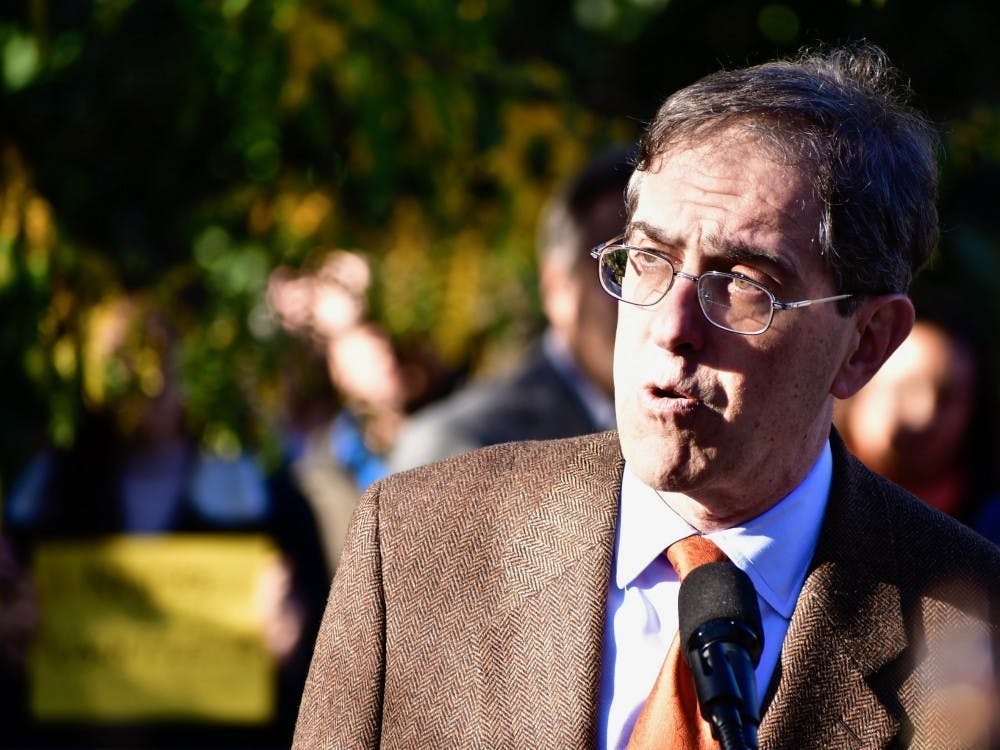In his fourth annual letter to the University community, President Christopher L. Eisgruber ’83 discussed upcoming construction projects that will improve facilities and expand the undergraduate student body.
According to Eisgruber, new construction projects, from laboratories to student residences, will further the University’s goal of inclusion. He described two new residential colleges to be built south of Poe Field, which are expected to be ready for the 2022-23 academic year. These residential colleges will allow the University’s undergraduate class to expand by 10 percent and temporarily replace Wilson College dormitories undergoing renovations.
To meet the needs of an expanded student body, Dillon Gymnasium will be expanded and partially renovated, and University Health Services will be improved and expanded to include a building attached to a renovated Eno Hall, Eisgruber wrote.
According to Eisgruber, the University will break ground on additional projects in the next 15 months: a new soccer practice field, the new Myslik Field and Roberts Stadium, a parking garage, and a geothermal energy plant, Thermally Integrated Geo-Exchange Resource (TIGER), which “will use geothermal wells to reduce the University’s need to purchase energy” and help the University achieve its goal of net zero greenhouse gas emissions by 2046, its 300th anniversary.
He also described plans to rebuild the University Art Museum to “heighten its visibility, expand the range of works that it can display, and invite participatory engagement from our campus and the surrounding community.” This project is expected to start by January 2021, when the main museum building will be officially closed to visitors.
Other planned projects will provide a new home for the environmental sciences, a suite of engineering buildings, and a new institute in bioengineering. Additionally, Guyot Hall will be renovated and renamed Eric and Wendy Schmidt Hall and house the Department of Computer Science.
In the letter, Eisgruber also recounted the story captured in a recent Princeton Alumni Weekly article about Oswald Veblen, a mathematician who taught for nearly 50 years at the University and the Institute for Advanced Study. Eisgruber stressed Veblen’s efforts towards inclusion, from “rescuing Jewish scholars from persecution” abroad to drawing more diverse scholars to Princeton.
Veblen was instrumental in the founding of the Institute for Advanced Study, which at the time was more inclusive than the University, welcoming people such as the female mathematician Emmy Noether and black mathematician William Claytor. He also made many contributions to the original Fine Hall, now Jones Hall, by helping it become “perhaps the world’s most extraordinary gathering place for mathematicians and theoretical physicists,” Eisgruber wrote.

Eisgruber urged the University community to learn from Veblen’s work.
“Our University and our country succeed best when they are open to honest, hard-working people from all backgrounds, regardless of status or national origin,” Eisgruber wrote.
Eisgruber also identified a few current trends, such as rise in anti-Semitism, the Trump administration’s restriction of immigration, and tensions between the U.S. and China, as antithetical to the academic inclusion and openness originally envisioned by Veblen. He drew a parallel between the experiences of the refugees Veblen aided and the participants of the Deferred Action for Childhood Arrivals (DACA) program, one of whom the University, along with Microsoft, represented in the Supreme Court.
Noting the success of this past semester’s “Thrive: Empowering and Celebrating Princeton’s Black Alumni” conference, Eisgruber pledged to “continue our efforts to ensure that every member of our campus community is respected and capable of participating fully in the life of the University.”

Expanding on the theme of inclusivity, Eisgruber emphasized the potential of these new construction projects to strengthen the bonds between members of the Princeton community and make research and study at the University more accessible.
“Most importantly,” he wrote, “the new buildings will aim to stimulate the kind of creativity and engagement that are essential to Princeton’s mission and that were on Oswald Veblen’s mind when he planned Fine Hall, and shaped this University’s future so profoundly, ninety years ago.”
Reminding readers of next academic year’s new calendar, which includes a start date before Labor Day and fall semester final examinations before winter break, Eisgruber noted that the calendar change will allow for an optional two-week Wintersession “designed for innovative, non-graded learning and growth opportunities.”
The letter will be the basis of an annual Town Hall meeting of the Council of the Princeton University Community (CPUC), which will take place on Monday, Feb. 10 in the Multipurpose Room on the B level of Frist Campus Center.








